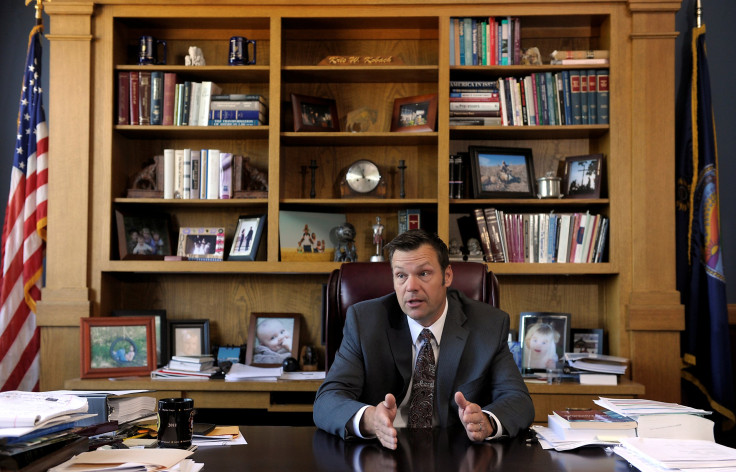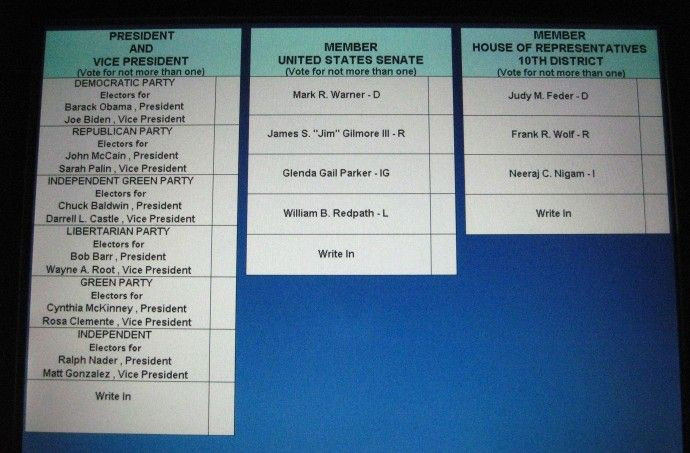Did Kris Kobach's Voter Fraud Crusade Hurt Fundraising For His Gubernatorial Bid?

Kansas Secretary of State Kris Kobach has become a national political player by taking a page from the Joseph McCarthy playbook: promise to crack down on an insidious threat to American democracy that doesn’t actually seem to exist. Now in the days since his voter fraud commission was disbanded by President Donald Trump, it seems that his quixotic quest to eliminate voter fraud might have actually hurt, not helped, his bid to be the next governor of Kansas, at least when it comes to fundraising.
Kobach, a Republican, raised just $355,000 for his gubernatorial bid in 2017, falling far short of the $632,000 raised by Jeff Colyer, the state’s Republican lieutenant governor, according to state campaign finance disclosures made public Thursday. The news is a blow to Kobach, who the Kansas City Star said was “largely seen as the GOP frontrunner” and held a campaign fundraiser with Donald Trump Jr. in November.

“It’s humiliating” for Kobach, Patrick Miller, a political scientist at the University of Kansas, told the Star. “...In terms of expectations, it’s embarrassing.”
While independent candidate Greg Orman raised $453,000, Kobach still raised more money than any potential Democratic challenger, including Josh Svaty, a former state secretary of agriculture who raised just $192,545 in the deep red state, which both Trump and Mitt Romney won by 20 percentage points.
Kobach has been waging a war against voter fraud since he was elected as secretary of state in 2010, a war that political opponents have characterized as voter suppression (the American Civil Liberties Union called him “the king of voter suppression.”) In 2015, he convinced the state legislature to give him the power to prosecute voter fraud cases, a first for any of the nation’s secretaries of state. Despite his claims of widespread illegal voting by non-citizens, Kobach has managed to win just nine convictions for voter fraud in the intervening years, most of them seniors who own property in two states and were “confused about voting requirements,” according to the New York Times. Just one was a noncitizen who voted illegally.
Nearly two million people are registered to vote in Kansas, which, thanks in part to Kobach, had one of the nation's most stringent voter ID laws until a judge struck down the law in 2016.
In Trump, Kobach found a political ally and someone else willing to publicly decry an epidemic of widespread illegal voting absent any evidence. After Trump made the unfounded claimed that he only lost the popular vote to Hillary Clinton in 2016 because of “millions of people who voted illegally,” the president tapped Kobach and Vice President Mike Pence to lead a Presidential Advisory Commission on Election Integrity in May 2017. The commission soon ran into problems, however, when states refused to hand over their voter registration data. Eventually, one of the commission’s own members, Maine Secretary of State Matthew Dunlap, a Democrat, sued the commission to find out just what it was doing. As it turned out, the commission wasn’t doing much at all, and last week Trump disbanded the commission.
The Republican gubernatorial primary is scheduled for Aug. 7, with the general election scheduled for Nov. 6. The candidates will vie to replace term-limited Republican Gov. Sam Brownback, one of the least popular governors in the U.S.
© Copyright IBTimes 2024. All rights reserved.





















